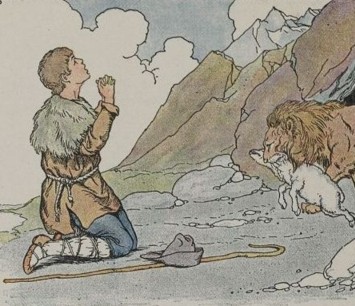| 1. irritated | /IR-i-tey-tid/ |
| -annoyed | |
| I became irritated by her questions. | |
| 2. declare | /dih-KLAIR/ |
| -to announce something clearly, firmly, publicly, or officially | |
| She declared that it was the best food she had ever tasted. | |
| 3. suspect | /suh-SPEKT/ |
| -to think or believe something to be true or probable | |
| We had no reason to suspect that he might do that act. | |
| 4. sacrifice | /SAK-ruh-fahys / |
| -something useful or important that you choose not to do or have, in order to have something that is more important | |
| We had to make sacrifices in order to earn money. | |
| 5. terror | /TER-er / |
| -extreme fear | |
| What he said struck terror in my heart |

Much irritated, he very loudly and boastfully declared that he would catch the thief and punish him as he deserved. The Shepherd suspected a Wolf of the deed and so set out toward a rocky region among the hills, where there were caves infested by Wolves. But before starting out he made a vow to Jupiter that if he would help him find the thief he would offer a fat Calf as a sacrifice.
The Shepherd searched a long time without finding any Wolves, but just as he was passing near a large cave on the mountain side, a huge Lion stalked out, carrying a Sheep. In great terror the Shepherd fell on his knees.
“Alas, O Jupiter, man does not know what he asks! To find the thief I offered to sacrifice a fat Calf. Now I promise you a full-grown Bull, if you but make the thief go away!”
We are often not so eager for what we seek, after we have found it. Do not foolishly ask for things that would bring ruin if they were granted.
| 1. | What did the Shepherd discover one day? |
| 2. | How did the Shepherd react when he found out what happened to the sheep? |
| 3. | What did the Shepherd pray to Jupiter when he saw the huge Lion in front of him? |
| 1. | Why do you think the Shepherd suspected a Wolf of the deed? |
| 2. | Do you think it is a good idea when the Shepherd vowed to offer a fat Calf as a sacrifice? Why? |
| 3. | Do you think the Shepherd could escape the Lion if he decided to run away instead of falling on his knees? Why or why not? |
| 4. | Have you wished for something that you regretted having after? Please tell me more about it. |
| 5. | Do you think that you have to be careful of what you wish for? Please explain your answer. |
| Grammar 文法 |
Pronunciation 発音 | Vocabulary 単語 |
Comprehension 理解 |
|
|---|---|---|---|---|
 GOOD GOOD |
文法の誤りはほとんどなく、完全な文章で話すことができる | ほとんどの単語をはっきりと正しく発音することができる | 習った表現を適切に使うことができる | 文章を理解し、質問に正しく答えることができる |
 FAIR |
文法の誤りはあるが、完全な文章で話すことができる | 発音の練習が必要な言葉がいくつかある | たまにミスはあるが、習った表現を適切に使うことができる | 文章を完全に理解するのは難しく、質問に正しく答えられないときもある |
 POOR |
文章で話すのは難しく、単語だけで話すことができる | 発音の練習が必要である | 習った単語と表現を少しだけ使うことができる | 文章を理解するのは難しく、質問に答えるのは難しい |
An eBook from The Project Gutenberg.
This eBook is for the use of anyone anywhere at no cost and with almost no restrictions whatsoever. You may copy it, give it away or re-use it under the terms of the Project Gutenberg License included with this eBook or online at www.gutenberg.org